|
|
|
Sort Order |
|
|
|
Items / Page
|
|
|
|
|
|
|
| Srl | Item |
| 1 |
ID:
186945
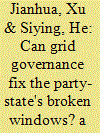

|
|
|
|
|
| Summary/Abstract |
Grid governance has been developed by the Chinese party-state to collect intelligence at the grassroots level for the early pre-emption of what it defines as social instability. Using data collected from four months’ participant observation and extensive interviews with personnel who work in the grid governance system in what we call W Street, a location in a second-tier city in southern China, this paper examines how China's grid governance is used for stability maintenance and how in practice the system has become alienated from its original purpose of social control. We find that grid governance is achieved mainly through three mechanisms: intelligence gathering, case coordination and real-time reporting for stability maintenance. We further reveal that while grid governance provides an important infrastructural power for intelligence gathering, the realization of this power could be hindered by contradictory logics among different levels of government. This research not only provides empirical data on how China's grid governance works in practice but also calls for a rethinking of the capacity of China's stability maintenance regime.
|
|
|
|
|
|
|
|
|
|
|
|
|
|
|
|
| 2 |
ID:
186937
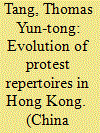

|
|
|
|
|
| Summary/Abstract |
The Anti-Extradition Bill protests in 2019 culminated in an unprecedented level of violence that departed from the established peaceful social struggles in Hong Kong. This paper examines the evolution of protest repertoires by analysing the interactions between protesters and state actors on a local and global scale. A dataset is presented to show the type, frequency and distribution of tactics. This paper reveals that structural and cultural changes as well as activists’ cognitive, affective and relational transformations at the micro- and meso-levels were pertinent to tactical radicalization. Cognitively, militant tactics were pragmatic responses to state-sponsored violence and police violence. They were also the affective outcomes of grief and anger. These processes were intertwined with the relational dynamics that advocated horizontal mobilization and that shaped, and were shaped by, the political-economic interactions between China and the West. The result was an extensive use of violent tactics alongside innovations in non-violent tactics.
|
|
|
|
|
|
|
|
|
|
|
|
|
|
|
|
| 3 |
ID:
186939
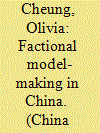

|
|
|
|
|
| Summary/Abstract |
This article introduces the analytical framework of “factional model-making” to describe and explain the open political contention of Chinese Communist Party elites in the policy process. Party elites undertake factional model-making to express policy disagreements and to signal their power to the regime: by flouting the Party line publicly without punishment, they show that they can influence the Party line and therefore pressurize the regime into acknowledging their position in the opaque power structure. This article chronicles the history of factional model-making from the 1960s to 2012 and examines in detail the making of Henan's Nanjie Village into a re-collectivization model by the Party's left. The process began in the 1990s and ended soon after Xi Jinping came to power in 2012, which prompted Nanjie's patrons to recast the village as a Party model trumpeting Xi's line. The suppression of factional model-making under Xi is discussed in the conclusion.
|
|
|
|
|
|
|
|
|
|
|
|
|
|
|
|
| 4 |
ID:
186938
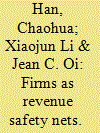

|
|
|
|
|
| Summary/Abstract |
The political connection between the state and firms in the context of China's corporate restructuring has been little explored. Using the clientelist framework and unpacking the incentives of both firms and the state, we analyse political connections as repeated patron–client exchanges where the politically connected firms can help the state fulfil its revenue imperative, serving as a failsafe for local authorities to ensure that upper-level tax quotas are met. Leveraging original surveys of the same Chinese firms over an 11-year period and the variations in their post-restructuring board composition, we find that restructured state-owned enterprises (SOEs) with political connections pay more tax than their assessed amount, independent of profits, in exchange for more preferential access to key inputs and policy opportunities controlled by the state. Examining taxes rather than profits also offers a new interpretation for why China continues to favour its remaining SOEs even when they are less profitable.
|
|
|
|
|
|
|
|
|
|
|
|
|
|
|
|
| 5 |
ID:
186942
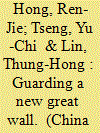

|
|
|
|
|
| Summary/Abstract |
The household registration (hukou) system has been widely recognized as a key contributory factor to social inequality and tensions in China yet it remains intact despite a series of institutional reforms. What explains the resilience of the system? In this study, we address this puzzle by drawing on policy documents, statistical data and interviews. We argue that the hukou system remains because it is used to protect the beneficiaries of welfare provision and to ensure pivotal groups continue to offer political support. We find that owing to the reforms, a formidable barrier has been erected between the guarded cities and other regions to protect healthcare and education resources from inbound migrant workers. Consequently, the institutional reforms of the hukou system serve as a political contrivance for the survival of the Chinese party-state regime. The findings contribute to emerging literature on China's political control by elaborating political elites’ subtle tactics through various institutions at central and local levels. We expect the new “Great Wall” established under Xi's administration to be an even stronger barrier than before for migrants during the current pandemic and in the future.
|
|
|
|
|
|
|
|
|
|
|
|
|
|
|
|
| 6 |
ID:
186941
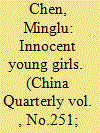

|
|
|
|
|
| Summary/Abstract |
There are few women among China's local political leadership. Current scholarship on the topic co-locates women's political participation with the representation of other marginalized social groups. In particular, it is argued that female politicians are simply tokenistic representatives of the marginalized: female, intellectual, ethnic minority and non-Communist Party members. An examination of those women who have served in provincial leadership positions over the last two terms suggests that such a characterization is misleading. Rather, the evidence indicates that women have been appointed on the same grounds as male leaders in terms of age, education, CCP membership and experience. Gender disparities in the selection of provincial leaders are in fact considerably more nuanced and can be traced to the lack of institutionalized policies and processes as well as women's ongoing disadvantages in education, political networks and training.
|
|
|
|
|
|
|
|
|
|
|
|
|
|
|
|
| 7 |
ID:
186948
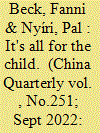

|
|
|
|
|
| Summary/Abstract |
Middle-class parents in China are increasingly torn between the need to secure their child's future in an environment where competition starts in kindergarten and parenting ideologies focusing on the child's individuality, creativity and freedom. Our study, based on ethnographic fieldwork among middle-class Chinese migrants in Budapest, shows that one result of this tension is a new wave of emigration that is justified in terms of securing a relaxed, healthy and free environment for the child. These migrants consciously reject what they see as a materialistic and dehumanizing social environment in China and pursue a “European” lifestyle that they imagine as wholesome and human-centred; yet while they rejoice in the “happiness” of their children, they retain a deep-seated anxiety about their children's future. Thus, the search for a mentally and physically wholesome environment consonant with China's discourse of national revitalization becomes decoupled from its original agenda and triggers a new trend in international mobility. This study illustrates how the broader tensions in the relationship between China's middle class and the state are externalized to the global stage.
|
|
|
|
|
|
|
|
|
|
|
|
|
|
|
|
| 8 |
ID:
186940
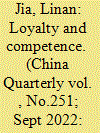

|
|
|
|
|
| Summary/Abstract |
Scholarly debate on the role of various contributing factors in cadre promotion yields conflicting evidence for different administrative levels in China, yet rarely has any quantitative evidence been presented for below the county level. This study explores the causal relationship between loyalty, competence and promotion at the township level. Based on an original dataset of local cadre training records, this paper utilizes cadres’ training experience at Party schools and academic institutions to account for loyalty and competence at the local level. Using a rigorous data-preprocessing method – coarsened exact matching (CEM) – this paper explores the causal effects of cadre training on promotion. The empirical results show that Party school training significantly increases the probability of promotion for township-level cadres, while university training contributes to chances of promotion to a lesser but indispensable degree. Moreover, local cadres who are both Party school and university trained enjoy the best chances of promotion.
|
|
|
|
|
|
|
|
|
|
|
|
|
|
|
|
| 9 |
ID:
186946
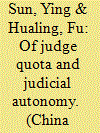

|
|
|
|
|
| Summary/Abstract |
This article presents the findings of original research on “judge quota” reform. The reform's agenda was essentially aimed at professionalization: by edging out a given percentage of judges, only the better qualified judges would be re-appointed to create a more professionalized judiciary. A key component of the reform was to reduce the level and the intensity of both political and bureaucratic control over judges in adjudication and to decentralize judicial power to the rank-and-file judges, restoring individualized judging while enhancing judicial accountability. This article critically examines the potential and limits of the judge quota reform in the context of incremental legal reform in a party-state.
|
|
|
|
|
|
|
|
|
|
|
|
|
|
|
|
| 10 |
ID:
186947
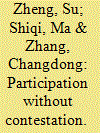

|
|
|
|
|
| Summary/Abstract |
How do non-governmental organizations (NGOs) advocate public policies? What impacts their advocacy strategies? Although scholars have addressed these questions in a democratic context, less is known about NGO advocacy under powerful authoritarian regimes. Using China as a case study, we develop an institutional explanation of NGOs’ policy advocacy patterns and explore the impacts of NGO autonomy. Using a unique dataset of registered NGOs in three Chinese provinces, we find that NGOs with more autonomy tend to conduct direct negotiations with the government more actively (more political advocacy). However, these more autonomous NGOs are likely to be more hesitant to mobilize society from the bottom up (less social advocacy). These findings enrich our knowledge of social actors’ roles in the policymaking process in China.
|
|
|
|
|
|
|
|
|
|
|
|
|
|
|
|
| 11 |
ID:
186944


|
|
|
|
|
| Summary/Abstract |
Using ethnographic data gathered in Beijing during 2017 and 2018, this article examines numerous urban population displacement events using the concept of spatial governance in order to understand the spatialization of governance in urban China. A particular focus of this article are the Beijing-wide displacements of the so-called “low-end population” that followed a fire in Xinjian Village in 2017. The analysis in this article uses geographic understandings of spatial informality to interrogate how space is made informal and subsequently illegal as a means of population control. The article puts forward the idea that spatial governance is one of the key forms, if not the key form, of governance in urban China. It highlights changes in governance that have resulted in space becoming not just a site for control, but the medium for techniques of control over China's urban population.
|
|
|
|
|
|
|
|
|
|
|
|
|
|
|
|
| 12 |
ID:
186943


|
|
|
|
|
| Summary/Abstract |
Land expropriation, where peasants’ property rights are encroached by the state, has been recognized as a primary source of social dissension in rural China. Since the end of the last century, the Administrative Litigation Law (ALL) has provided people with a legal weapon to defend themselves against violations by state power. Drawing on the theory of relative deprivation, this paper proposes that peasants are more likely to sue the state when they feel deprived. To examine this hypothesis, we first present a case study to depict the causal process and then use quantitative research to improve the external validity of our findings. We created a novel and unique database of prefecture-level administrative litigations and relative deprivation for Poisson regression analysis. The quantitative results prove that the more peasants feel relatively deprived, the more likely they are to sue the state. Furthermore, the positive effect of relative deprivation on administrative litigations has become more significant over time, implying peasants’ growing awareness of legal resistance. This paper concludes that a critical step towards eliminating social inequity and maintaining social stability in rural China is to reduce the relative deprivation of peasants by, for example, allowing them to share in land value appreciation in the process of urbanization.
|
|
|
|
|
|
|
|
|
|
|
|
|
|
|
|
| 13 |
ID:
186936
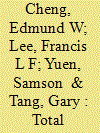

|
|
|
|
|
| Summary/Abstract |
This article examines the origins and dynamics of an extraordinary wave of protests in Hong Kong in 2019–2020. Despite lacking visible political opportunities and organizational resources, the protest movement drew resilient, mass participation unparalleled in the city's history and much of the world. Drawing from original on-site surveys and online datasets, we conceptualize the Anti-Extradition Law Amendment Bill Movement as a form of “total mobilization from below.” The totality of the mobilization depended on a set of interactive mechanisms: abeyant civil society networks concealed after the 2014 Umbrella Movement were activated by threats over extradition and institutional decay, whereas affective ties developed through conflicts and mutual assistance were amplified by digital communication. The movement's characteristics in terms of protest scale, mobilizing structure, use of alternative spaces, and group solidarity are examined. The spasmodic moments of mobilization are explained by a nexus of network building that took place in an unreceptive environment and at a critical juncture. The roles of threats and emotions in mass mobilizations are also analysed.
|
|
|
|
|
|
|
|
|
|
|
|
|
|
|
|
|
|
|
|
|